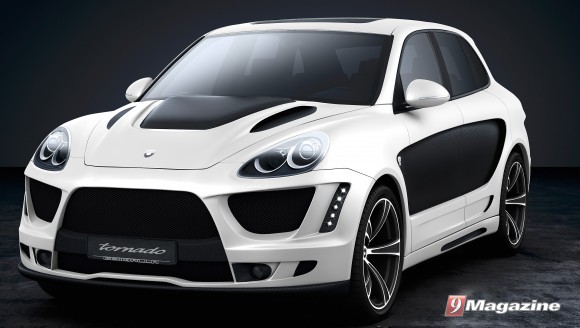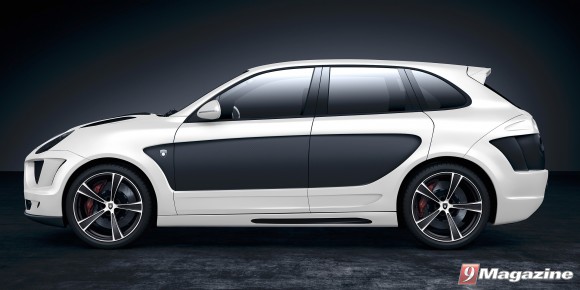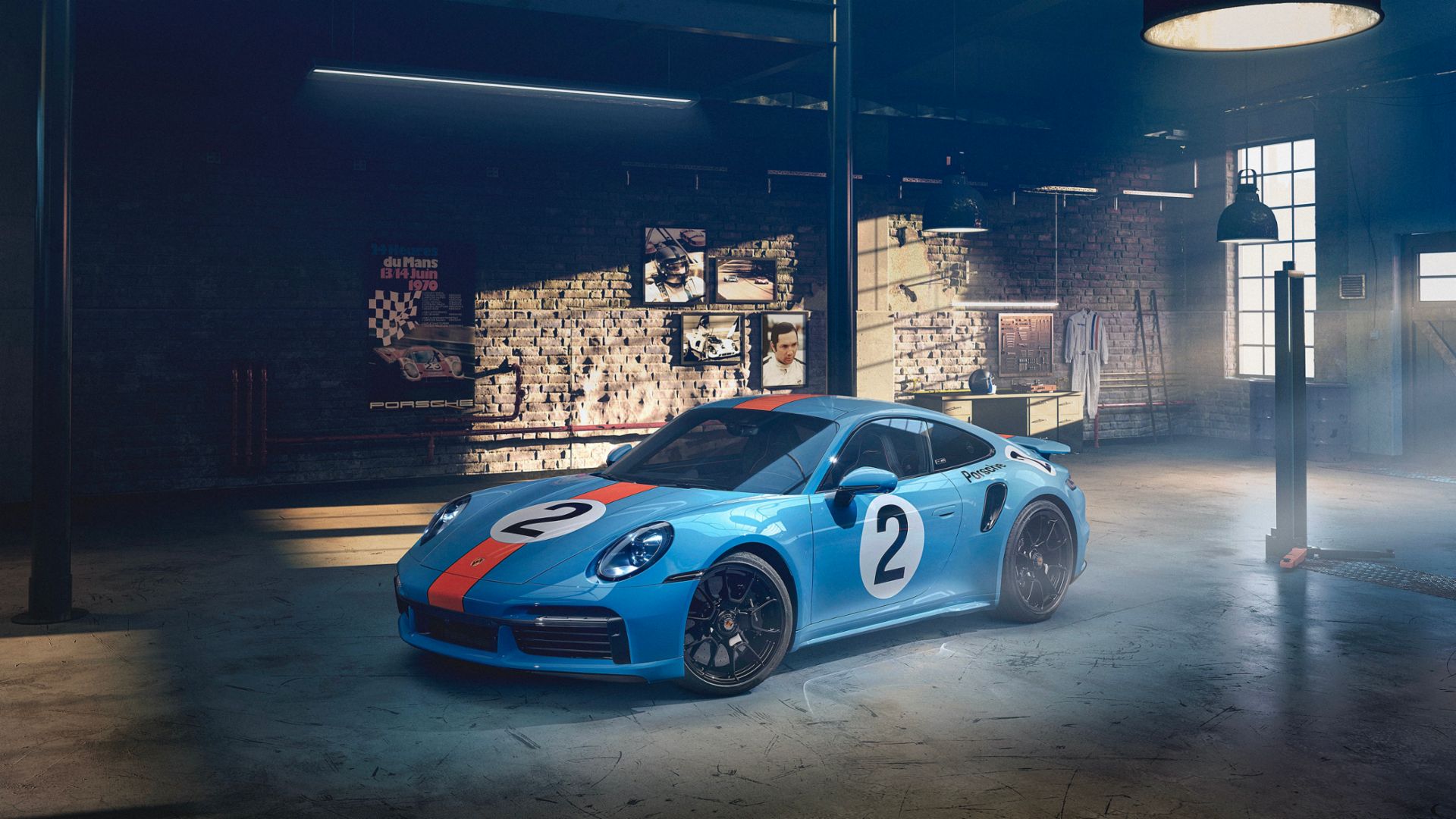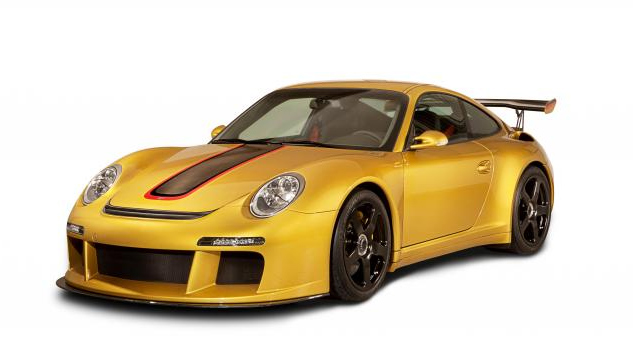 Leonberg, Germany – Dec. 16, 2010 – Gembella GmbH has announced the debut of the Tornado, based on the new Porsche Cayenne 958.
Leonberg, Germany – Dec. 16, 2010 – Gembella GmbH has announced the debut of the Tornado, based on the new Porsche Cayenne 958.
This exciting car is significant not only because it is the first creation of the new Gemballa GmbH, but also because its light and strong carbon-fibre body panels showcase the way forward for the top players in the aftermarket industry, raising the bar for exclusive car manufacturers. In the past, it was commonplace to bond carbon-fibre parts to modified factory steel panels.
However, this does not significantly lighten a car, nor is it a rigorous use of this lightweight material. “Carbon-fibre is a high strength, low weight structural material that needs to be used honestly, and not just for decoration,” explains Gemballa GmbH CEO, Andreas Schwarz. Thus, other than its steel body-in-white, rear quarter and roof panels and hatchback, almost all the steel body panels on the TORNADO are replaced by carbon-fibre equivalents.
The carbon-fibre bonnet, front wings, side sill covers, doors, front and rear bumper/valance and rear hatch outer skin save around 70kg compared to the original steel panels and PU bumpers, and all the new panels use the factory mounting points. However, security-related features, such as the passenger safety cell and door side impact protection are untouched, and none of the modifications compromise comfort either. While this is an expensive alternative to the traditional methods, there is a good reason to do it this way apart from just weight saving. “Cutting, filing, and then bonding and blending materials with different coefficients of expansion is setting yourself up for problems further down the line unless the work is done perfectly,” says Andreas Schwarz. “In very hot or cold climates, where many of our clients live, extremes of temperature may eventually cause problems like cracking and de-lamination. So while one-piece carbon-fibre panels are expensive, it means that the fit and finish, whether the new panels are left in visible carbon or painted, will be perfect and consistent. In addition, the relative ease of fitting makes life easier for our dealers around the world.”
 The new front styling delivers significant autobahn overtaking presence with the large grille, flanked by two smaller ones providing copious amounts of ram air for the two stages of uprated, twin-turbocharged engine. Brake cooling ducts sit beside the fog lights, and the vertical LED daytime running lights also help to give the Gemballa Tornado that all-important instant recognition factor. The complete carbon-fibre door assemblies are designed as direct replacements for the steel factory units, and incorporate the factory steel side impact protection bars, central locking and electric window mechanisms. The recessed surfaces, in matt finished visible carbon, give the sides of the Tornado a heavily sculpted look, inspired by the Gemballa Avalanche GTR. The same matt black visible carbon finish is used on the new tail panel and rear corners. Because of the structural architecture of the rear quarter panels, the wider rear wheel arches are grafted to the car by the more normal method of cutting the metal, and bonding and blending in the wider carbon-fibre arches.
The new front styling delivers significant autobahn overtaking presence with the large grille, flanked by two smaller ones providing copious amounts of ram air for the two stages of uprated, twin-turbocharged engine. Brake cooling ducts sit beside the fog lights, and the vertical LED daytime running lights also help to give the Gemballa Tornado that all-important instant recognition factor. The complete carbon-fibre door assemblies are designed as direct replacements for the steel factory units, and incorporate the factory steel side impact protection bars, central locking and electric window mechanisms. The recessed surfaces, in matt finished visible carbon, give the sides of the Tornado a heavily sculpted look, inspired by the Gemballa Avalanche GTR. The same matt black visible carbon finish is used on the new tail panel and rear corners. Because of the structural architecture of the rear quarter panels, the wider rear wheel arches are grafted to the car by the more normal method of cutting the metal, and bonding and blending in the wider carbon-fibre arches.
The Tornado’s overall width is increased to 2.05m. The steel structure of the tailgate is mated to a new carbon-fibre skin, which re-contours it and covers the recesses and holes provided for the inner half of the factory tail light assemblies. The new, stacked round rear light design completely changes the look of the Cayenne’s rear, reinforcing the four individual round exhaust outlets, a long-standing Gemballa design motif. If the angels are in the details, a close inspection of the Gemballa badge on the new tailgate reveals lettering cut out with incredible precision. Here, the same ultra high-pressure water jet cutting process used in the electronics industry to slice through heat sensitive circuit boards, is used to cut the Gemballa name out of a piece of carbon-fibre. The brushed stainless steel panel below provides the silver colouring.
 The enlarged wheel arches are filled by huge wheels, 10.0J x 22-inch with 295/35 ZR22 tyres on the front axle, and 12.0J x 22-inch with 335/30 ZR22 tyres at the rear. Despite their greater size, these forged, ultra-light and strong monoblock alloys are no heavier than the standard 20-inch wheels. And thanks to their narrow-spoke design, they appear to be even larger in diameter than they actually are. The uprated braking system is made by Brembo, Gemballa’s partner for brake component development. Massive 420 mm vented discs with six-pot callipers are used at the front, with 405 mm vented discs and four-pot callipers at the rear. All four discs are cross-drilled and slotted, and made exclusively for Gemballa in these sizes. Gemballa already offers a Stage One Cayenne Turbo engine conversion with 580 hp. The Tornado will be equipped with Stage Two, which is nearing its final development stage. The goal for the engineers was well defined, a 35-40% power increase, which equates to between 675 and 700 hp. The projected torque increase of 30%, or close to 1,000 Nm, requires the relevant drivetrain components to be uprated as well. As with all Gemballa cars, the interior will be equally special, and the engineers and trim specialists are developing a completely new design for the Tornado’s cabin. This will be characterised by both elegance and functionality. The Gemballa Tornado celebrates the 30th year of the GEMBALLA brand in 2011.
The enlarged wheel arches are filled by huge wheels, 10.0J x 22-inch with 295/35 ZR22 tyres on the front axle, and 12.0J x 22-inch with 335/30 ZR22 tyres at the rear. Despite their greater size, these forged, ultra-light and strong monoblock alloys are no heavier than the standard 20-inch wheels. And thanks to their narrow-spoke design, they appear to be even larger in diameter than they actually are. The uprated braking system is made by Brembo, Gemballa’s partner for brake component development. Massive 420 mm vented discs with six-pot callipers are used at the front, with 405 mm vented discs and four-pot callipers at the rear. All four discs are cross-drilled and slotted, and made exclusively for Gemballa in these sizes. Gemballa already offers a Stage One Cayenne Turbo engine conversion with 580 hp. The Tornado will be equipped with Stage Two, which is nearing its final development stage. The goal for the engineers was well defined, a 35-40% power increase, which equates to between 675 and 700 hp. The projected torque increase of 30%, or close to 1,000 Nm, requires the relevant drivetrain components to be uprated as well. As with all Gemballa cars, the interior will be equally special, and the engineers and trim specialists are developing a completely new design for the Tornado’s cabin. This will be characterised by both elegance and functionality. The Gemballa Tornado celebrates the 30th year of the GEMBALLA brand in 2011.
Only 30 numbered Gemballa Tornado cars will be built, making this a very special and exclusive model.
Source: Gemballa



